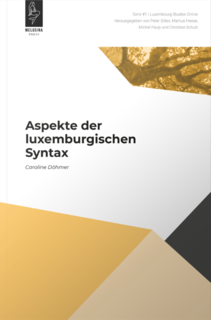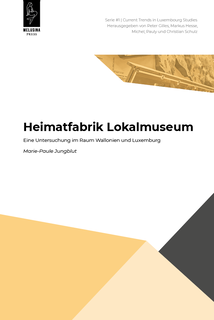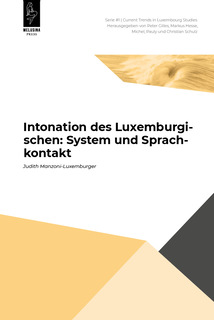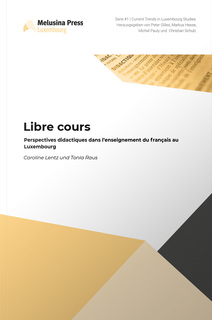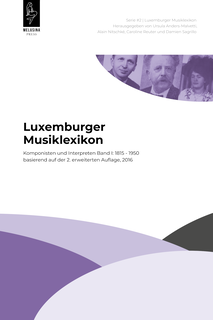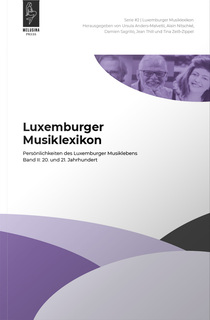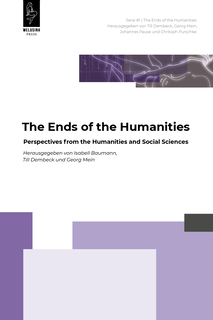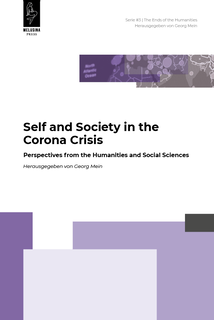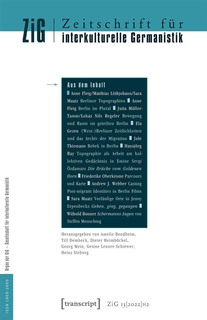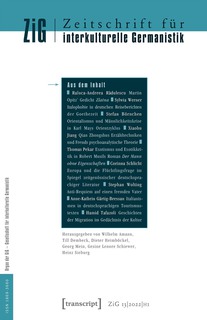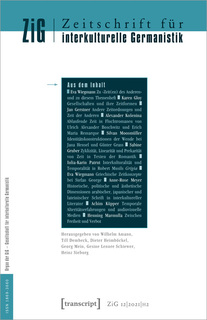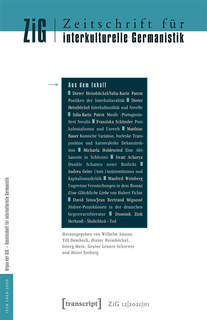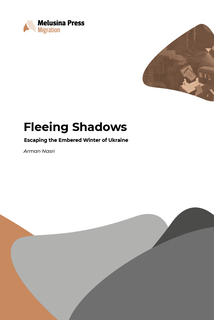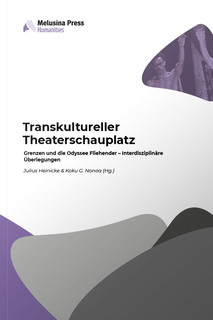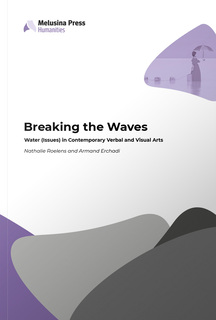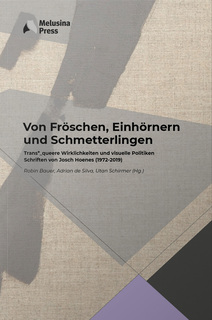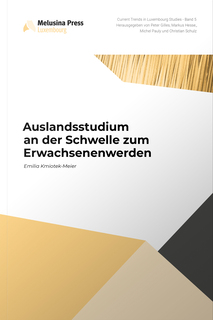project collections
ISSN: 2716-7518
Editors: Peter Gilles, Markus Hesse, Michel Pauly, Christian Schulz,
Content: the open-access book series Current Trends in Luxembourg Studies (CTLS) is intended as a fast publication platform for current research on Luxembourg from the perspectives of humanities and social sciences. The series publishes dissertations, monographs, edited volumes, research reports etc. It is open for contributions both from the University of Luxembourg and from external institutions.
Review: all volumes are subject to a single-blind peer-review process. Except for PhD dissertations, the manuscript will be reviewed anonymously by two peers from the respective field. In case of a PhD dissertation, only one peer will be solicited for a review. This peer will then also receive for reference the original reviews from the PhD examination. The reviewers will be selected by the editor responsible for the respective publication.
Submissions: Book proposals and manuscripts that are within the scope of the series can be submitted at any time to:
For detailed information about the series, refer to the series page at:
https://www.melusinapress.lu/page/current-trends-in-luxembourg-studies.
Editors: Peter Gilles, Markus Hesse, Michel Pauly, Christian Schulz,
Content: the open-access book series Current Trends in Luxembourg Studies (CTLS) is intended as a fast publication platform for current research on Luxembourg from the perspectives of humanities and social sciences. The series publishes dissertations, monographs, edited volumes, research reports etc. It is open for contributions both from the University of Luxembourg and from external institutions.
Review: all volumes are subject to a single-blind peer-review process. Except for PhD dissertations, the manuscript will be reviewed anonymously by two peers from the respective field. In case of a PhD dissertation, only one peer will be solicited for a review. This peer will then also receive for reference the original reviews from the PhD examination. The reviewers will be selected by the editor responsible for the respective publication.
Submissions: Book proposals and manuscripts that are within the scope of the series can be submitted at any time to:
peter [dot] gilles [at] uni [dot] lu. Submissions should comply with Melusina's template and guidelines (Link).
For detailed information about the series, refer to the series page at:
https://www.melusinapress.lu/page/current-trends-in-luxembourg-studies.
Editors: Ursula Anders-Malvetti, Alain Nitschké, Caroline Reuter, Damien Sagrillo, Jean Thill, Tina Zeiß-Zippel
Content: The Luxemburger Musikerlexikon is an encyclopaedia of another kind. Not only does it provide detailed information about Luxembourg's composers and performers, but it also contains quotations from contemporaries or descendants as well as pictorial material.
The first volume contains articles about musicians who were active in Luxembourg and covers the period between 1815 and 1950. In 1815 the Luxembourgish State was recognised as a sovereign nation by the Congress of Vienna and thus gained its independence. 1950 stands for a break or a new beginning after the Second World War. The birth cohorts of the musicians in this volume cover a period from 1773 to 1914.
The 2nd volume contains articles on personalities of Luxembourg's musical life in the 20th and 21st centuries.
Thanks to the new version being online instead of in printed form, both volumes now have even more use, greater functionality and diverse worth and feel more dynamic, interactive and alive than ever. Through the use of hyperlinks, the articles are now both interconnected and connected to external sites. The articles being online also allows us to update and amend articles with ease as new information reaches us.
Review: Each article manuscript is reviewed by another peer and the musician/composer the article is about (in case the person has passed away, by a family member) in an unblinded review process. After copy-editing the editorial board carries out another review and makes a final decision on the publication.
Submission: no open submission process
For detailed information about the series, refer to the series page at:
https://www.melusinapress.lu/page/luxemburger-musiklexikon
Content: The Luxemburger Musikerlexikon is an encyclopaedia of another kind. Not only does it provide detailed information about Luxembourg's composers and performers, but it also contains quotations from contemporaries or descendants as well as pictorial material.
The first volume contains articles about musicians who were active in Luxembourg and covers the period between 1815 and 1950. In 1815 the Luxembourgish State was recognised as a sovereign nation by the Congress of Vienna and thus gained its independence. 1950 stands for a break or a new beginning after the Second World War. The birth cohorts of the musicians in this volume cover a period from 1773 to 1914.
The 2nd volume contains articles on personalities of Luxembourg's musical life in the 20th and 21st centuries.
Thanks to the new version being online instead of in printed form, both volumes now have even more use, greater functionality and diverse worth and feel more dynamic, interactive and alive than ever. Through the use of hyperlinks, the articles are now both interconnected and connected to external sites. The articles being online also allows us to update and amend articles with ease as new information reaches us.
Review: Each article manuscript is reviewed by another peer and the musician/composer the article is about (in case the person has passed away, by a family member) in an unblinded review process. After copy-editing the editorial board carries out another review and makes a final decision on the publication.
Submission: no open submission process
For detailed information about the series, refer to the series page at:
https://www.melusinapress.lu/page/luxemburger-musiklexikon
ISSN: 2716-7550
Editors: Till Dembeck, Georg Mein, Johannes Pause, Christoph Purschke
Content: The book series "The Ends of the Humanities" assembles contributions that demonstrate how the work of the humanities brings about new approaches to the analysis and sustainable development of cultural practices. Contributions to this series will develop new empirical perspectives on current global issues and advance the borders of disciplinary self-reflection through theoretical accounts of scholarly work and the epistemological foundations of the humanities. They will engage with the complex dynamics of culture and with new forms of cultural engineering which evolve, for example, with digitization and the rise of artificial intelligence.
Review: The concept of each book is reviewed by the series editors in advance. Finished monographs are also evaluated by the series editors. The review of individual contributions to collected volumes is organized by the editors of these publications. In principle, any model from editor review to double-blind peer review is possible here, as long as it is guaranteed that every contribution is assessed. Since the series usually publishes interdisciplinary anthologies, it is the responsibility of the book editors to involve competent experts from all relevant disciplines in the review process. Contributions or monographs that do not meet the quality standards of the respective editors may be returned for revision or rejected.
Submission: Book proposals and manuscripts that are within the scope of the series can be submitted at any time to:
For detailed information about the series, refer to the series page at:
https://www.melusinapress.lu/page/the-ends-of-the-humanities
Editors: Till Dembeck, Georg Mein, Johannes Pause, Christoph Purschke
Content: The book series "The Ends of the Humanities" assembles contributions that demonstrate how the work of the humanities brings about new approaches to the analysis and sustainable development of cultural practices. Contributions to this series will develop new empirical perspectives on current global issues and advance the borders of disciplinary self-reflection through theoretical accounts of scholarly work and the epistemological foundations of the humanities. They will engage with the complex dynamics of culture and with new forms of cultural engineering which evolve, for example, with digitization and the rise of artificial intelligence.
Review: The concept of each book is reviewed by the series editors in advance. Finished monographs are also evaluated by the series editors. The review of individual contributions to collected volumes is organized by the editors of these publications. In principle, any model from editor review to double-blind peer review is possible here, as long as it is guaranteed that every contribution is assessed. Since the series usually publishes interdisciplinary anthologies, it is the responsibility of the book editors to involve competent experts from all relevant disciplines in the review process. Contributions or monographs that do not meet the quality standards of the respective editors may be returned for revision or rejected.
Submission: Book proposals and manuscripts that are within the scope of the series can be submitted at any time to:
johannes [dot] pause [at] uni [dot] lu. Submissions should comply with Melusina's template and guidelines (Link).
For detailed information about the series, refer to the series page at:
https://www.melusinapress.lu/page/the-ends-of-the-humanities
ISSN: 1869-3660
Herausgeber:innen: Wilhelm Amann, Till Dembeck, Dieter Heimböckel, Georg Mein, Gesine Lenore Schiewer, Heinz Sieburg
Inhalt: Die Zeitschrift für interkulturelle Germanistik (ZiG) trägt dem Umstand Rechnung, dass sich in der nationalen und internationalen Germanistik Interkulturalität als eine leitende und innovative Forschungskategorie etabliert hat. Sie greift aktuelle Fragestellungen im Bereich der germanistischen Literatur-, Kultur- und Sprachwissenschaft auf und möchte dazu beitragen, die unterschiedlichen Tendenzen und Trends der Interkulturalitätsforschung zu bündeln und ihre theoretischen Voraussetzungen weiter zu vertiefen. Insofern das Forschungsparadigma der Interkulturalität prinzipiell nicht mehr einzelfachlich gedacht werden kann, versteht sich die Zeitschrift bewusst als ein interdisziplinär und komparatistisch offenes Organ, das sich im internationalen Wissenschaftskontext verortet sieht.
Die Zeitschrift für interkulturelle Germanistik wird im transcript Verlag publiziert und im Rahmen eines Open Access Kooperationsvertrags als erweiterte Onlineausgabe auf Melusina Press republiziert.
Review: Articles are pre-reviewed by the editorial board. If generally fitting to the topic of the journal, they are forwarded to a double-blind peer review by two external experts. In cases of doubt, a third expert can be involved.
Einreichung: Beiträger senden ihre Manuskripte bitte in elektronischer Form als Word- oder RTF-Datei an contact [at] zig-online [dot] de. Hinweise zur Einrichtung der Beiträge finden Sie unter zig-online.de.
Herausgeber:innen: Wilhelm Amann, Till Dembeck, Dieter Heimböckel, Georg Mein, Gesine Lenore Schiewer, Heinz Sieburg
Inhalt: Die Zeitschrift für interkulturelle Germanistik (ZiG) trägt dem Umstand Rechnung, dass sich in der nationalen und internationalen Germanistik Interkulturalität als eine leitende und innovative Forschungskategorie etabliert hat. Sie greift aktuelle Fragestellungen im Bereich der germanistischen Literatur-, Kultur- und Sprachwissenschaft auf und möchte dazu beitragen, die unterschiedlichen Tendenzen und Trends der Interkulturalitätsforschung zu bündeln und ihre theoretischen Voraussetzungen weiter zu vertiefen. Insofern das Forschungsparadigma der Interkulturalität prinzipiell nicht mehr einzelfachlich gedacht werden kann, versteht sich die Zeitschrift bewusst als ein interdisziplinär und komparatistisch offenes Organ, das sich im internationalen Wissenschaftskontext verortet sieht.
Die Zeitschrift für interkulturelle Germanistik wird im transcript Verlag publiziert und im Rahmen eines Open Access Kooperationsvertrags als erweiterte Onlineausgabe auf Melusina Press republiziert.
Review: Articles are pre-reviewed by the editorial board. If generally fitting to the topic of the journal, they are forwarded to a double-blind peer review by two external experts. In cases of doubt, a third expert can be involved.
Einreichung: Beiträger senden ihre Manuskripte bitte in elektronischer Form als Word- oder RTF-Datei an contact [at] zig-online [dot] de. Hinweise zur Einrichtung der Beiträge finden Sie unter zig-online.de.
ISSN: 2989-7343
Editors: Thomas Brunner, Laurence Buchholzer, Xavier Hermand, Michel Margue, Jean-François Nieus, Timothy Salemme
Content: In·Scriptis. Cultures médiévales de l’écrit – Mittelalterlichen Schriftkulturen – Medieval Literacies is a journal devoted to the study of writing practices in the Medieval latin West (5th-15th centuries), mainly, but not solely in North-Western Europe. It is part of the historiographical renewal that has taken place over the last three decades and tends to constitute a field of study on medieval Literacy that considers all dimensions of the written word, its materiality as well as social issues linked to its production, or its uses and its conservation.
Review: All contributions published in In·Scriptis. Cultures médiévales de l’écrit – Mittelalterlichen Schriftkulturen – Medieval Literacies will be submitted to an anonymous double-blind peer-review. After a preliminary evaluation by the editorial board, each contribution proposal will be submitted to two reviewers, selected internationally because of their expertise in the involved research fields. The names of the reviewers are published on the webpage Reviewers (which is constantly updated). Their reports are archived in a dedicated space.
Submission: Full manuscriptsfor the following issue can be submitted to
For detailed information about the journal, available in French, English and Italian, refer to the journal page at:
https://www.melusinapress.lu/page/in-scriptis-en.
Editors: Thomas Brunner, Laurence Buchholzer, Xavier Hermand, Michel Margue, Jean-François Nieus, Timothy Salemme
Content: In·Scriptis. Cultures médiévales de l’écrit – Mittelalterlichen Schriftkulturen – Medieval Literacies is a journal devoted to the study of writing practices in the Medieval latin West (5th-15th centuries), mainly, but not solely in North-Western Europe. It is part of the historiographical renewal that has taken place over the last three decades and tends to constitute a field of study on medieval Literacy that considers all dimensions of the written word, its materiality as well as social issues linked to its production, or its uses and its conservation.
Review: All contributions published in In·Scriptis. Cultures médiévales de l’écrit – Mittelalterlichen Schriftkulturen – Medieval Literacies will be submitted to an anonymous double-blind peer-review. After a preliminary evaluation by the editorial board, each contribution proposal will be submitted to two reviewers, selected internationally because of their expertise in the involved research fields. The names of the reviewers are published on the webpage Reviewers (which is constantly updated). Their reports are archived in a dedicated space.
Submission: Full manuscriptsfor the following issue can be submitted to
inscriptis [@] uni [dot] lu until the 30th of April of each year. For further information refer to the journal page.
For detailed information about the journal, available in French, English and Italian, refer to the journal page at:
https://www.melusinapress.lu/page/in-scriptis-en.


